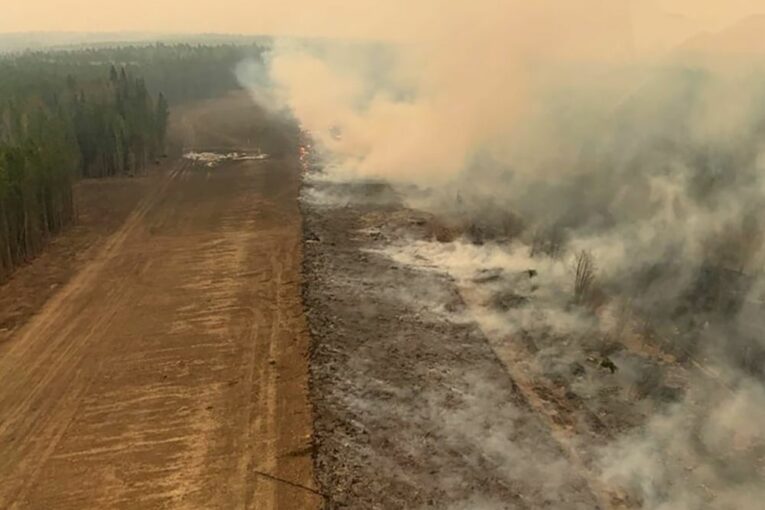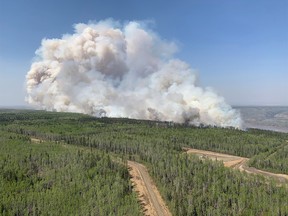
The wildfires that triggered the evacuation of nearly 30,000 Albertans from their homes over the weekend also left Canadian petroleum producers hustling to close down facilities, idle rigs, relocate staff to safety and shut in thousands of barrels of oil and gas production.
Over the weekend and on Monday, a series of oil and natural gas producers — including Cenovus Energy, Tourmaline Oil Corp., Vermilion Energy, Crescent Point Energy, NuVista Energy and Paramount Resources — announced they’ve shut in output from various sites across central and northern Alberta.
There were 88 active wildfires in Alberta as of Monday afternoon, including 25 deemed out of control, while 29,000 people have been evacuated from their homes, the provincial government reported.
Over the weekend, petroleum producers curtailed output and halted drilling in some areas due to concerns surrounding the wildfires, although rain and cooler weather were helping the situation on Monday.
“It is still a serious situation. We’ve got three rigs here that have been evacuated and four rigs on standby, and we’re monitoring the situation,” Ensign Energy Services president Bob Geddes said in an interview.
“On Saturday, we had three of the crews — three of the rigs — where forestry (officials) came in and told us, ‘Hey guys, it’s time to get out.’ ”
Ensign’s rigs were drilling in the Brazeau County and Edson regions, areas where mandatory evacuation orders had been issued, although they were lifted for the town of Edson on Monday morning.
“Some of the fires got very close to the rigs . . . There have been some perimeter camps and well-site shacks that have been burned, but nothing on the rigs,” Geddes added.
“Things seem to be settling down a little bit. As you know, it can change. But it is cooler out there and it’s not as windy.”
Recommended from Editorial
-

Alberta wildfires live updates for May 8
-

Energy companies curtail production due to Alberta wildfires
-

Calgary deploys personnel to fight Alberta wildfires, opens reception centre for evacuees
The energy industry, like municipal and provincial governments, does have experience dealing with weather-related emergencies, including the 2013 floods in southern Alberta and the May 2016 wildfires in the Fort McMurray area. Those fires led to up to one million barrels per day of oilsands output being taken off-line at one point.
The 2023 fires are affecting production in the Montney and Duvernay areas, as well as some conventional oil and gas sites in the province.
Kiwetinohk Energy said it safely shut in the majority of its Placid operations near Fox Creek due to downstream third-party interruptions.
“As an oil and gas company, you pride yourself on having strong emergency response protocols. We practice a variety of different types of response scenarios,” said company chief operating officer Mike Backus.
NuVista Energy said Monday it temporarily shut in about 40,000 barrels per day due to the wildfires in the Grande Prairie region as a precautionary step, and it was broadened by the shut-in of third-party infrastructure that serves its operations.
Cenovus reported it curtailed a number of conventional fields and processing plants, affecting about 85,000 boe per day, mainly gas produced from its Rainbow Lake, Kaybob-Edson, Elmworth-Wapiti and Clearwater operating areas.
Crescent Point Energy announced it shut in about 45,000 boe per day in the Kaybob Duvernay area as a precaution.
And Tourmaline Oil Corp. said staff and their families were evacuated from operated facilities and homes in the Edson area, as the company shut nine gas processing facilities on Friday and Saturday. The Calgary-based producer isn’t aware of any damage to its facilities.
“It’s an hour-by-hour process. We have been able to regain access to some, even today, but it’s obviously a very dynamic situation,” Jamie Heard, Tourmaline’s manager of capital markets, said Monday.
“We’re hopeful the weather conditions today and (Tuesday) allow the fire professionals in the areas to make some headway.”

Paramount Resources said it temporarily curtailed about 50,000 boe of production in the Kaybob and Grande Prairie regions, and evacuated all affected personnel, while Vermilion Energy shut in about 30,000 boe per day at its west central Alberta operations.
Whitecap Resources CEO Grant Fagerheim said the company is assessing the effect of the fires on its operations in central and northern Alberta and northeast British Columbia, noting some production was affected by interruptions to third-party processors, although some output has since come back.
“Starting on Friday, it’s been all hands on deck,” Fagerheim said in an interview.
“Our field superintendents have been running around and, frankly, getting tired. They are working 20-hour shifts, just making sure everyone is safe and healthy.”
TC Energy said Monday that it shut down two compressor stations on the Nova Gas Transmission Ltd. system near the wildfires in western Alberta.
In total, western Canadian gas production has fallen by about two billion cubic feet (bcf) per day since Thursday to about 15.5 bcf, said Martin King, senior analyst with RBN Energy in Calgary.
“That’s a little bit more than 10 per cent of the production of the basin that has been impacted by the fire and the shut-ins. That’s a pretty sizable number,” King said.
“We haven’t seen a lot of big impact on price yet, and that is primarily because demand is just generally soft elsewhere in North America and there is a lot of gas in storage . . . It will really depend on how long it lasts.”
Chris Varcoe is a Calgary Herald columnist.
You can read more of the news on source
